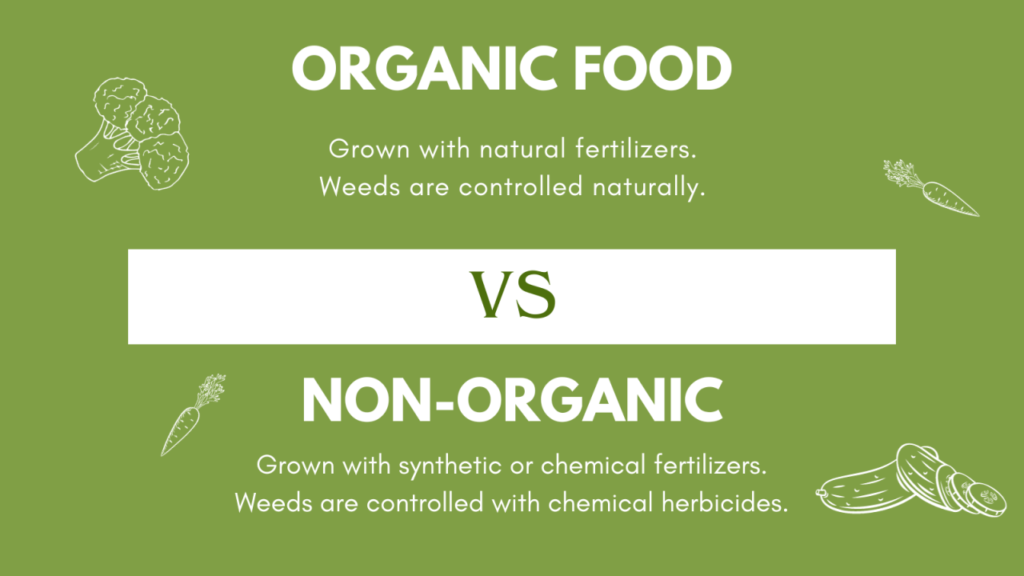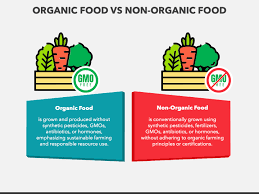As an Amazon Associate I earn from qualifying purchases.
What is the difference between organic and non-organic foods? It’s a question that’s more important than ever, as people become more aware of the impact of food choices on their health and the environment. So, what’s the difference? Why does it matter?
What’s the difference between organic and non-organic foods?
It’s a question that’s becoming increasingly important, as more and more people are wondering about the impact of their food choices on their health and the environment. So, what’s the difference? Why does it matter? There are two main types of food: organic and non-organic. Organic farmers use natural methods like crop rotation, composting, and biological pest control to maintain soil fertility and manage pests. As a result, organic foods are healthier for people and the planet.
Non-organic foods grow using conventional methods that typically involve synthetic chemicals. These methods can be more cost-effective and yield larger quantities of produce, but they may also raise concerns about potential health effects and environmental impact.
Ultimately, the decision to choose organic or non-organic is a personal one. There are pros and cons to consider, including cost, availability, health, and the environment. However, by understanding the differences between organic and non-organic foods, you can make an informed choice that aligns with your values and goals.
There are many reasons to choose organic produce. Non-organic foods grow using synthetic chemicals that are harmful to the environment. Synthetic fertilizers and pesticides can pollute soil and water and harm wildlife. Organic farming, on the other hand, uses natural methods, such as crop rotation and composting, which help to preserve soil quality and promote biodiversity.
Ultimately, the decision to choose organic or non-organic is a personal one. There are pros and cons to consider, including cost, availability, health, and the environment. However, by understanding the differences between organic and non-organic foods, you can make an informed choice that aligns with your values and goals.
Organic Foods: What You Need to Know
Organic foods grow and process without the use of synthetic pesticides, herbicides, or fertilizers. This means that they are not only better for your health, but also for the environment. The farming practices used to grow organic food to protect water quality, reduce soil erosion, and promote biodiversity. Organic farmers rely on natural methods like crop rotation, composting, and biological pest control to maintain soil fertility and manage pests.
For consumers, choosing organic means opting for produce and other agricultural products that are free from potentially harmful chemicals. Organic farming also promotes biodiversity and supports ecosystems by avoiding the negative environmental impacts associated with conventional farming practices.

Non-Organic Foods: The Conventional Alternative
In contrast, non-organic foods, often referred to as conventional foods to produced using conventional farming methods. These methods typically involve the use of synthetic pesticides and fertilizers to maximize crop yields. Conventional farming may also involve the use of GMOs to enhance resistance to pests and diseases or to improve crop characteristics.
While conventional farming can be more cost-effective and yield larger quantities of produce, it raises concerns about the potential long-term health effects of pesticide residues and environmental impact.
Why Choose Organic?
The decision to choose organic over non-organic often boils down to personal health considerations and environmental stewardship. Organic foods contain higher levels of beneficial nutrients like antioxidants and lower levels of pesticide residues, making them a preferred choice for health-conscious individuals.
Moreover, by supporting organic farming practices, consumers contribute to the sustainability of agriculture and reduce their ecological footprint. Organic farming promotes soil health and biodiversity, which are critical for long-term food security and environmental sustainability.

Certification and Labels
To help consumers make informed choices, organic foods are typically certified by regulatory bodies that verify compliance with organic standards. Look for labels such as USDA Organic (United States), EU Organic, or equivalent local certifications, which indicate that the product meets strict organic farming guidelines.
Making the Choice
Ultimately, whether you opt for organic or non-organic foods depends on your personal values, health goals, and budget. While organic foods may come at a higher price point due to the intensive labor and sustainable practices involved, many consumers find the benefits outweigh the costs in terms of health and environmental impact.
Conclusion
Choosing between organic and non-organic foods is a decision that goes beyond personal preference. It involves considerations about health, environmental sustainability, and supporting agricultural practices that align with your values. By understanding the differences between organic and non-organic foods, you can make informed choices that contribute to your well-being and the health of our planet.
For those looking to prioritize health and sustainability, organic foods offer a compelling alternative to conventional options. Whether you’re shopping for fruits, vegetables, dairy, or grains, opting for organic is a step towards a healthier you and a healthier planet.
As an Amazon Associate, I earn from qualifying purchases
Leave a Reply